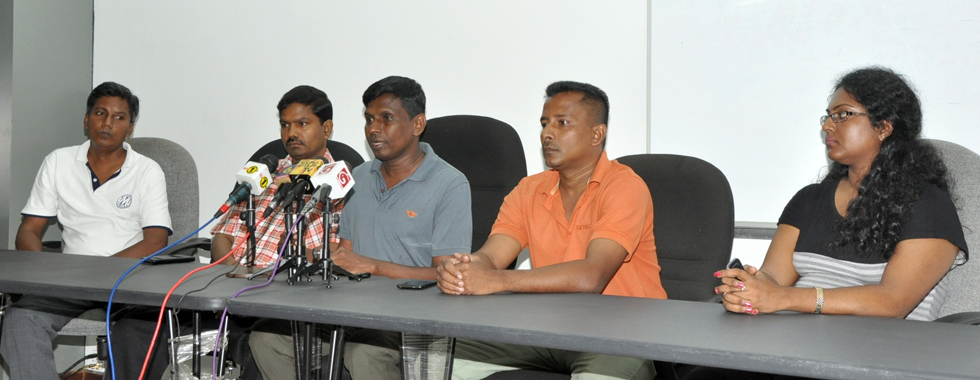[Sunil Jayasekara speaking at the Prees Briefing ,Photo: Sunday Times]
Bob Dietz —
There is genuine cause for alarm about the anonymous death threats going to Sunil Jayasekara’s phone. They started streaming to Jayasekara, the convener of Sri Lanka’s Free Media Movement, an umbrella group (hence calling the leader a convener) of journalists’ organization in Sri Lanka, just before an FMM press conference on Saturday in Colombo.
The hastily called press conference had its own daunting reason for being. It denounced the use of a mob of pro-government activists who blocked a group of about 11 Tamil journalists from attending a training program in Colombo earlier on Saturday. The group had traveled from the northern former war zone of Jaffna to attend the U.S.-funded workshop. They were stopped twice at road blocks while traveling to the capital city. When they did not turn back, a score or so of hastily assembled demonstrators barged into the Sri Lanka Press Institute and disrupted the session. The journalists had been there to learn about digital security and communications. If troops and cops at roadblocks can’t deter a determined group of journalists, a threatening and violent group of citizens, angered by journalists being trained to become better (and safer) at their jobs, could.
Jayasekara is well known to CPJ, I have met with him several times. And we have given him assistance in the past, at other times when he was also deeply in danger. Rail thin and soft spoken, married and a father, his integrity is not in question when he writes things like “Let’s stand together; Death threats will not deter us,” an article bylined by him shortly after the group’s Saturday press conference. “I was born in this country and will die in this country. We are ready to face the challenge,” he wrote. It appeared on the website Sri Lanka Brief, which offers “news, views and analysis of human rights & democratic governance in Sri Lanka.” Underfunded and harassed, FMM does not maintain a website of its own.
There is little question that FMM was pushing the limits with this weekend’s training sessions and subsequent press conference. The harassment came after a government directive handed down July 1 warned non-governmental organizations like FMM not to make public statements or engage in training sessions. Such activities are “unauthorized” and “beyond their mandate,” the Ministry of Defense said. On July 8, the FMM released a statement condemning the government’s move.
In a strongly worded statement today, the United States Embassy in Colombo expressed its concern about the tactic of using well organized demonstrations to shut down events of which the Sri Lankan government does not approve: “These events continue a troubling pattern of impunity for those who interfere with both freedom of speech and freedom of assembly in Sri Lanka.”
The mob tactic, using demonstrators in civilian clothes to swarm a room full of journalists, was used again Monday to stifle media coverage of a rape trial in Jaffna. The victims were two preteen girls; the alleged perpetrators were navy men. The demonstrators seized journalists’ cameras and mobile phones and warned them not to publish news on the proceedings. A crowd of Tamil protesters was outside the courtroom, angered by what they considered a cover-up of what could prove to be a heinous crime.
Make no mistake. Using ostensible demonstrators in civilian clothes is only the latest tactic by Sri Lanka’s government to suppress the media. When that ploy fails, it falls back on anonymous threats to try to silence independent journalists. With Sri Lanka’s history of impunity in bringing the perpetrators of violence against journalist to justice, such threats have to be taken extremely seriously.
Sri Lanka has long been a dangerous country for the press, and ranks fourth on CPJ’s international Impunity Index, which spotlights countries where journalists’ are murdered regularly and their killers go unpunished. “The government of Mahinda Rajapaksa has shown no political will to address its record of perfect impunity in the nine murders of journalists that have taken place under his leadership, first as prime minister and then as president,” we noted in our index this year.
Bob Dietz, coordinator of CPJ’s Asia Program, has reported across the continent for news outlets such as CNN and Asiaweek. He has led numerous CPJ missions, including ones to Afghanistan, Pakistan, the Philippines, and Sri Lanka. Follow him on Twitter @cpjasia and Facebook @ CPJ Asia Desk.
